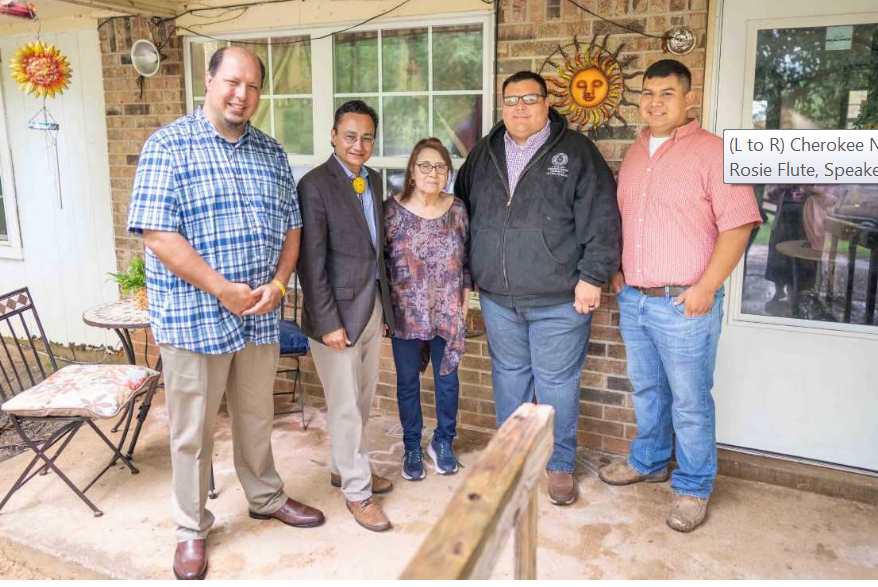
- Details
- By Chuck Hoskin Jr
Guest Opinion. As Cherokees, we are in a race to save our language. Deputy Chief Bryan Warner and I know that whatever we can do to save the Cherokee language will be our greatest legacy. Today only about 2,000 first-language speakers remain alive, and most of these men and women are over the age of 70. We must learn from their wisdom and knowledge for as long as we can, and they deserve to live in comfort and dignity while they teach us.
That is why Cherokee Nation recently launched a new Speaker Services program to address the day-to-day needs of our elder, fluent speakers. Instead of expecting elders to ask for help when they need it, we shifted that burden onto the tribal government. Our new Speaker Services team is taking the initiative and working directly with communities and families to see how we can better support our treasured speakers in their homes.
Speaker Services is working to identify essential needs, whether that means home repairs and upgrades like ramp installations, food assistance, transportation, help with utilities or even help with legal issues. We believe if Cherokees speakers aren’t worried about a leaking roof, securing a hearing aid or wheelchair, or any number of other household details, then they can focus on sharing language lessons with their family and other citizens who want to learn the Cherokee language.
We will not succeed on our language revitalization mission if we do not take care of our fluent Cherokee speakers. If we expect our speakers to be there for us, to help us perpetuate the Cherokee language, then we must be there for them. We know it can be difficult to reach out for help, so we devised a better way to serve them. It is already making a significant impact.
The Speaker Services program is operated by the Cherokee Nation’s Language Department and has four crews with workers who all speak Cherokee. So far, the team has installed 102 appliances and completed 57 property upgrades, 52 roof repairs, 40 walk-in showers, 28 HVAC upgrades and 18 electrical repairs, among other projects.
The program started out with just a few hundred thousand dollars to repair a few homes, with passionate volunteers working on the weekends and in their spare time. Now it has grown substantially. We are committing $7 million over the next three years as we project to fix about 1,200 more homes and address housing needs. We are also formalizing the program’s structure so that its activities are on secure footing for years to come. With the expanded program, we will be able to complete more costly repairs and upgrades that are sorely needed.
We are already making the largest investment in history to save the Cherokee language thanks to the Durbin Feeling Act passed in 2019 that allocates $16 million to language preservation. The Speaker Services program is another first-of-its-kind effort, which other tribal nations are already studying in hopes of replicating it.

The $7 million Speaker Services investment is just a part of our overall effort to provide assistance to elders and others in need across the reservation. Under the Housing, Jobs and Sustainable Communities Act we are investing $120 million in affordable housing, home repairs for all low-income elders and upgrades to community buildings over the next three years.
All of this means we are reaching out to our most vulnerable elders in record numbers. We are putting real resources behind the idea that elders should be honored.
Every day we hear from our community of speakers about how this innovative program is helping them live better, fuller lives. We understand that saving the Cherokee language is a mission we quite simply cannot fail. By serving our elderly fluent Cherokees, the Speaker Services program will help their precious knowledge live forever.
Chuck Hoskin, Jr. is the principal chief of the Cherokee Nation.
More Stories Like This
Disrupting Poverty Through OpportunityMarmot Day (Ground Hog Day) and the (Lack of) Law
Sanctuary Cities Under Siege: When Federal Power Becomes a Weapon Against the People
Denmark's Genocidal Practices in Greenland
Cherokee Nation Stands Against Predatory Lending
Help us defend tribal sovereignty.
At Native News Online, our mission is rooted in telling the stories that strengthen sovereignty and uplift Indigenous voices — not just at year’s end, but every single day.
Because of your generosity last year, we were able to keep our reporters on the ground in tribal communities, at national gatherings and in the halls of Congress — covering the issues that matter most to Indian Country: sovereignty, culture, education, health and economic opportunity.
That support sustained us through a tough year in 2025. Now, as we look to the year ahead, we need your help right now to ensure warrior journalism remains strong — reporting that defends tribal sovereignty, amplifies Native truth, and holds power accountable.
 The stakes couldn't be higher. Your support keeps Native voices heard, Native stories told and Native sovereignty defended.
The stakes couldn't be higher. Your support keeps Native voices heard, Native stories told and Native sovereignty defended.
Stand with Warrior Journalism today.
Levi Rickert (Potawatomi), Editor & Publisher

